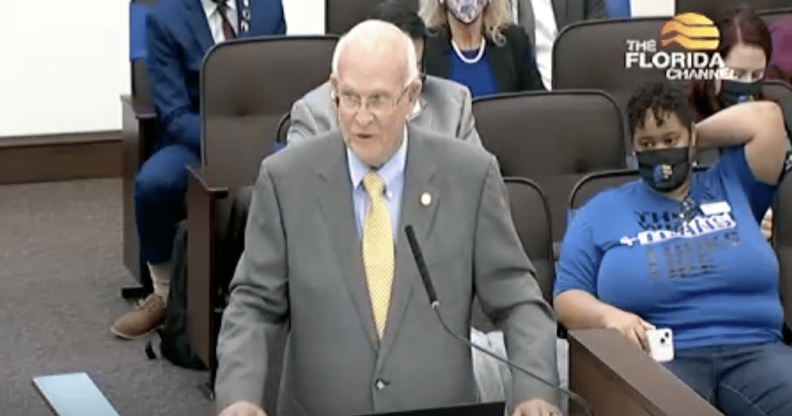Florida’s chilling ‘Don’t Say Gay’ bill inches closer to reality as it passes vital committee

Republican Florida state senator and Baptist funeral director Dennis Baxley said discussing LGBT+ issues was “social engineering”. (Florida Senate)
The Florida Senate education committee has passed SB 1834, dubbed the “Don’t Say Gay” bill, which would ban discussions about LGBT+ identities in the classroom.
The bill, introduced by Republican state senator and Baptist funeral director Dennis Baxley, would prevent teachers in Florida schools “from encouraging classroom discussion about sexual orientation or gender identity in primary grade levels”, or at any level if the discussion is “not age-appropriate or developmentally appropriate for students”.
It would also ban schools from having policies that discourage outing children to their parents, and families would then be able to sue schools if any of these rules were to be broken.
On Tuesday (8 February), the Florida Senate education committee passed the “Don’t Say Gay” bill in a six to three vote.
Once any differences between SB 1834 and its companion bill in Florida’s House of Representatives, HB 1557, have been reconciled, it will return to the House and Senate for final approval.
At the committee hearing, senator Baxley confirmed that the bill requiring “parental notification of and involvement in critical decisions affecting a student’s mental, emotional, or physical health or well-being” included outing students to their parents, and described the discussion of LGBT+ issues in schools as “social engineering”.
This week, Florida’s anti-LGBT+ governor Ron DeSantis endorsed the “Don’t Say Gay” bill, declaring at an appearance in Miami: “We’ve seen instances of students being told by different folks in school, ‘Oh, well, don’t worry, don’t pick your gender yet, do all this other stuff’.
“They won’t tell the parents about these discussions that are happening. That is entirely inappropriate.”
Kara Gross, the legislative director of the ACLU of Florida, said in a statement: “This government censorship bill seeks to ban classroom discussions related to sexual orientation and gender identity in schools.
“If passed, it would effectively silence students from speaking about their LGBTQ+ family members, friends, neighbours, and icons.
“Additionally, it would bar LGBTQ+ students from talking about their own lives and would deny their very existence. It is always appropriate for kids to talk about themselves, their experiences, and their family. These are not taboo subjects, but banning them makes them seem so.
“SB 1834/HB 1557’s dangerously vague provisions would have a chilling effect on support for LGBTQ+ youth because it creates new costly liabilities for school districts. Under the bill, any parent who thinks that a classroom discussion was inappropriate or who is unsupportive of a district’s policies would be given broad powers to sue for damages and attorneys’ fees.”
Gross added that the “Don’t Say Gay” bill “does nothing to help and support our youth”, and instead would “stigmatises” and “isolate” LGBT+ young people in Florida.
“This bill will have a real and devastating impact on LGBTQ+ youth, who already experience higher rates of bullying, homelessness, and suicide,” she added.
LGBT+ suicide prevention charity The Trevor Project echoed this point, with its director of advocacy and government affairs Sam Ames saying in a statement: “For those struggling, seeing positive LGBTQ representation in the classroom can give them hope that a brighter future is possible and prevent suicide.
“This bill also takes the additional, extreme step of forcing teachers to out students to their legal guardians, at a time when our 2021 national survey of more than 35,000 LGBTQ youth found that only one in three said their home is LGBTQ-affirming.”
They added: “Banning speech about sexual orientation and gender identity in Florida classrooms would not only be an infringement on civil rights, it would also erase entire chapters of history, classic literature, and critical health information from textbooks, to say nothing of erasing students themselves.
“LGBTQ youth deserve to learn that they are not alone – that they have a rich history and culture, and heroes like Marsha P Johnson, Harvey Milk, and Bayard Rustin.”

